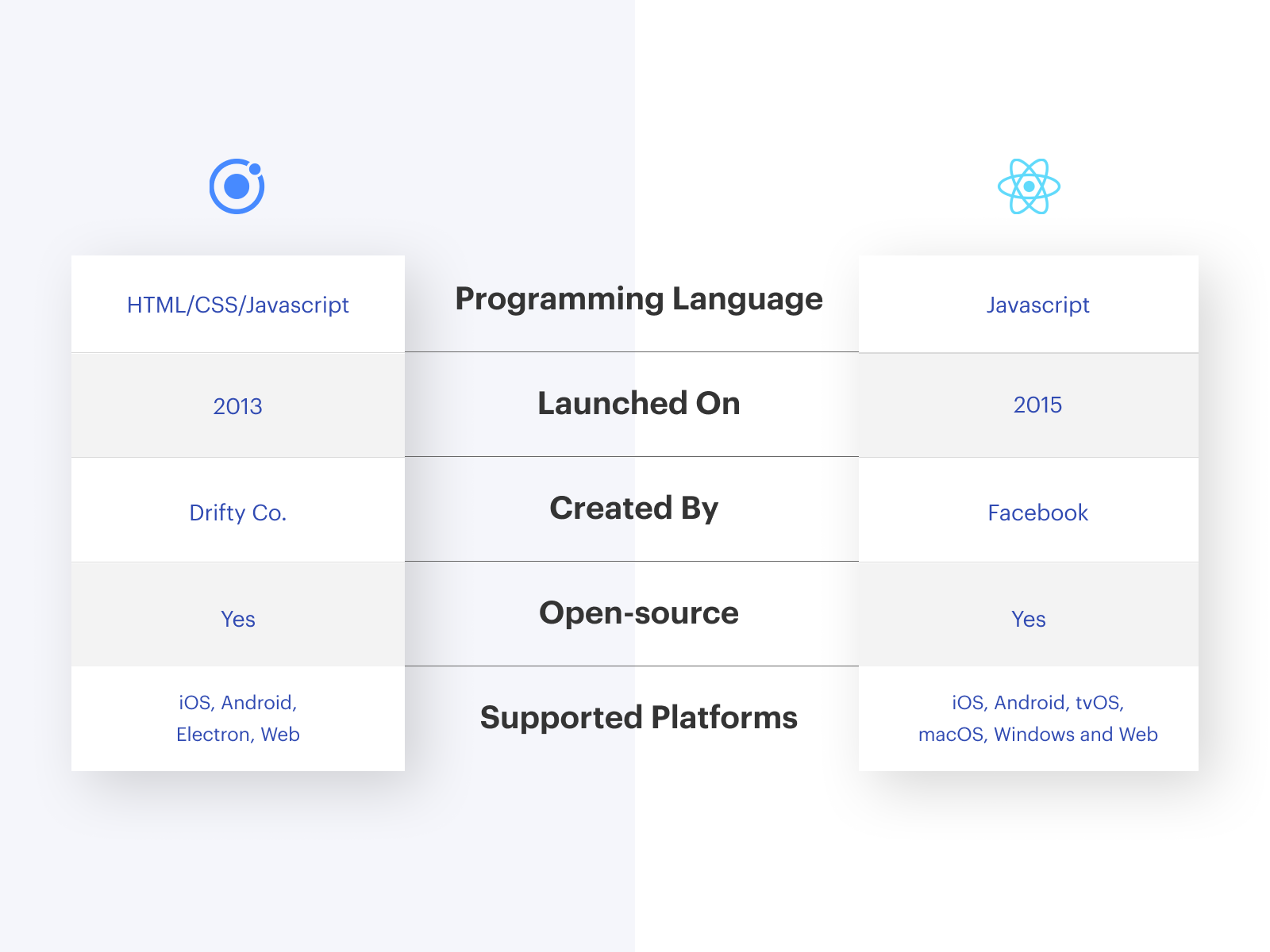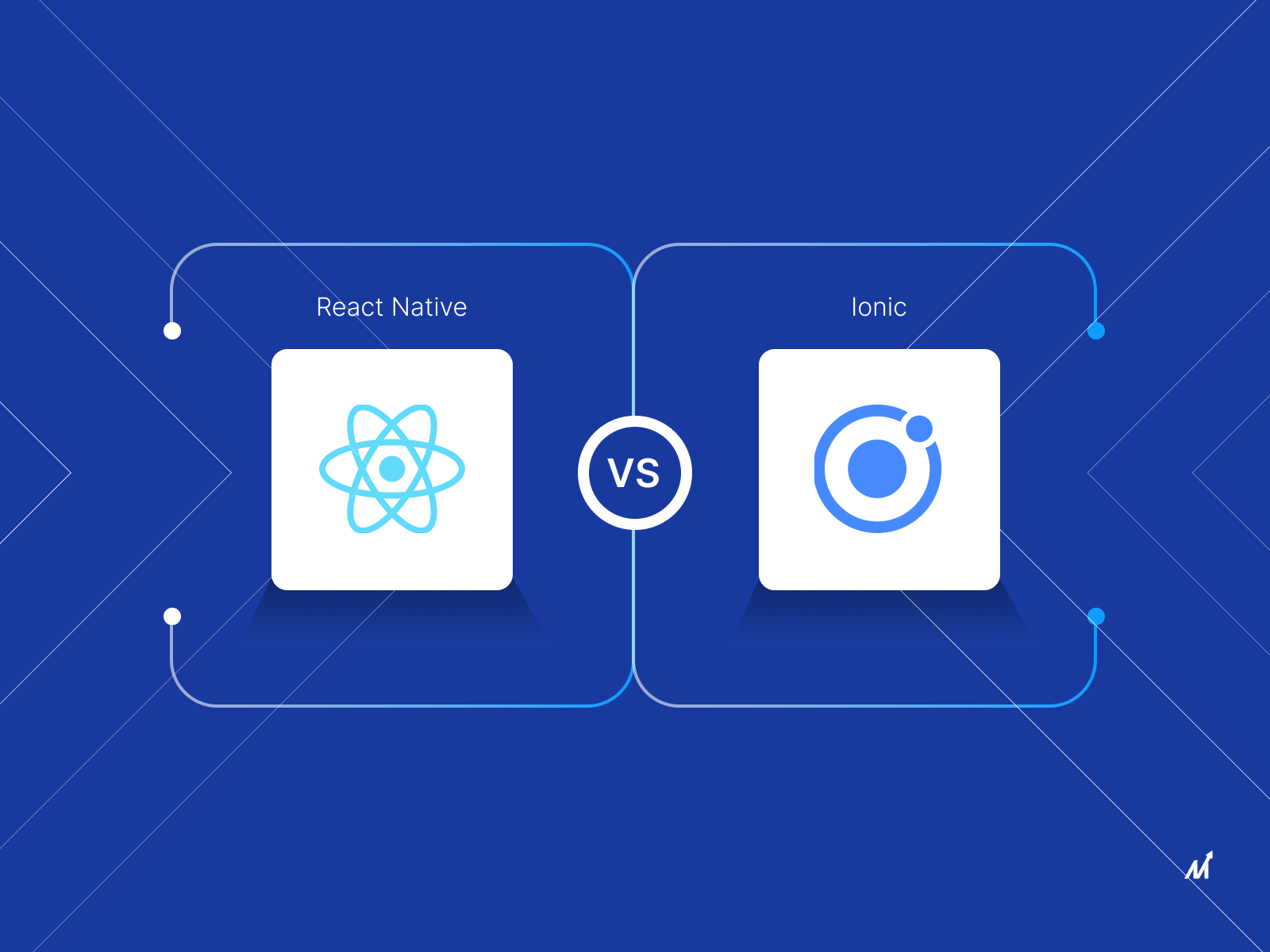Ionic vs React Native: Introduction
When companies engage developers, they use application frameworks to help them avoid typical difficulties when creating apps. Application frameworks aid in developing web-based applications and building graphical user interfaces (GUIs). These app development frameworks primarily create native, web, and hybrid apps. React Native, Flutter, Xamarin, Ionic, and Apache Cordova are well-known frameworks. When comparing cross-platform frameworks, the most heated argument is about Ionic vs React Native. In this blog, we will compare the speed, user experience, and other factors of the Ionic framework vs React Native.
An indicator of popularity is the number of stars awarded to the project’s GitHub repository. React Native has 99.6k stars as of December 2021. Ionic currently has 45k stars.
Google Trends measures the popularity of a search phrase. When comparing Ionic and React Native, we can observe that React Native has higher monthly searches than Ionic. The last popularity metric is the frequency with which developers submit articles about the framework on Medium.
Hence, this blog will navigate the differences between React Native and Ionic to understand which is more popular, efficient, and scalable for businesses looking to venture into the world of apps.
Ionic vs React Native: Comparison Of Usability
Ionic |
React Native |
|
Usage |
|
|
Features |
|
|
Examples of Top websites |
|
|
Further Read: Ionic vs Flutter: Choosing The Best Platform For Hybrid App Development
React Native vs Ionic: Structure Of Stack Comparison
- Ionic is a hybrid app development framework based on Angular. Its views are created using HTML templates. It adheres to the Model-View-Controller design pattern since arguments and logic are neatly separated. SCCS is used to apply the style to the HTML components.
- React Native enables developers to build mobile apps using React JS and JavaScript code similar to HTML. Display logic is combined with business logic in React Native.
Ionic vs React Native: UI/UX Performance
- When comparing the UI/UX performance of Ionic Framework vs React Native, React Native, React Native comes out on top.
- Any framework that relies on WebView rather than native components, such as Ionic, may experience UX/UI performance difficulties. Native built-in components outperform any other sort of implementation. React Native uses native components, which makes it quicker than Ionic.
- FPS (Frames Per Second) is a performance metric used to compare performance. An Ionic app would require extensive optimization to get 60 FPS (a reasonable baseline), but React Native apps can occasionally achieve 60 FPS without optimization.
React Native vs Ionic: The Future
- React Native is undergoing significant architectural changes, and the React Native team invites feedback from the developer community. The React Native team also stated that they are working with Microsoft to offer desktop app compatibility. This implies that the same codebase that powers your mobile app may be compiled into a desktop. It’s important news, especially for chat app developers, because most consumers expect chat applications to have desktop functionality.
- Ionic has proved agile and responsive to its user base while continuously enhancing the framework and releasing version upgrades. Implementing new features, such as Ionic Payments, shows that the Ionic team is trying to develop and bring new and enhanced capabilities.
- Both Ionic and React appear to have promising futures.
Benefits & Drawbacks Of Using React Native For Your Mobile Business App
Benefits Of React Native
- The availability of a large team of eager JS and native developers ready to share their knowledge and competence with publicly available components is one of the significant benefits of a community-driven ecosystem.
- Maximum code reuse and cost savings – With React Native, you can concurrently release code to iOS and Android. As a result, development costs and time are reduced significantly.
- The ‘hot reload’ function lets you quickly view the effect of the most recent modification you made to the code.
Drawbacks Of React Native
- Lack of native libraries – If the app has complex functions, React Native can stymie development due to a lack of native libraries and dependency on other third-party libraries.
- React Native is a loosely held abstraction layer in which programmers can access HTML tags, stylesheets like CSS, and code from JavaScript.
- Needing longer to initialize – Because the JavaScript thread takes time to initialize, React Native may take longer.
- Many native workarounds are required – If a given capability is not provided in React Native, developers have two options: ask any native developer to design a new one or develop the native modules in Swift/Objective-C and Java.
- License and Patenting Issues – Because Facebook controls React Native, approval and patenting issues exist.
Further Read: React Native Development: A Complete Guide
Benefits & Drawbacks Of Using Ionic For Your Mobile Business App
Benefits Of Ionic
- Web developers can create mobile apps since Ionic is built on standardized web technologies.
- It’s adaptable – Because it’s built on standardized web technologies, Ionic is exceptionally versatile.
- Several applications from a single codebase – Ionic can develop multiple apps from a single codebase.
- Ionic provides a collection of components and plugins, including front-end building blocks, UI components, standard app iconography, and more.
- Ionic seems like a native application due to its UI components library and its extensive selection of UI elements.

Drawbacks Of Ionic
- Performance on older devices may be an issue – It is slower on older devices than on newer devices.
- Precautions for security – Any mobile app development process will be riddled with security issues.
Further Read: Ionic Framework With Its Pros And Cons: The Essential Guide
React Native Vs Ionic: Summing Up With A Table Of Comparison

| Ionic | React Native | |
| Programming Language | HTML/CSS/JavaScript | JavaScript |
| Launched On | 2013 | 2015 |
| Created By | Drifty Co. | |
| Open-source | Yes | Yes |
| Supported Platforms | iOS, Android, Electron, Web | iOS, Android, tvOS, macOS, Windows, and Web |
Ionic vs React Native: Markovate’s Take
If you’re comparing Ionic to React Native or another Hybrid-Native framework, be sure to analyze the commitment you’re making and the strategy it takes. While both are good frameworks that will assist you in developing a fantastic app, the option for your team or company is determined by your overall vision and the appropriate functionality for your apps. Furthermore, you must analyze your selections depending on the criteria essential to you, such as design consistency, customization, platform independence, portability, and others.
When you consider the top priorities for selecting a technology to handle your app development operations, one apparent victor will likely emerge above the others for your next project. Remember that the decision has far less to do with the tech stack you’re used to and much more with how your app’s ideals coincide with the strategy used to develop it.
In a nutshell, we resolved the question of selecting the best cross-platform app development framework between React Native and Ionic.
Further Read: React Native vs Swift: What’s Better For iOS App Development?

React Native vs Ionic: FAQs
1. Can Ionic And React Native Be Used Together?
You can create fantastic mobile, desktop, and online apps with iconic frames using the React you know and love. Ionic React is the native React version of Ionic Framework, the free and open-source SDK that powers millions of mission-critical apps worldwide.
2. React Native Or Ionic: Which Is Faster?
Ionic cannot create Native apps since it always attempts hybrid mobile app development. React outperforms Ionic because it requires specific plugins to access native functionalities. React Native beats Ionic in terms of performance. Ionic is sluggish, and it takes longer to load Native features.
3. Is Ionic More Popular Than React Native?
- Both Ionic React and React Native are excellent options for mobile app development. However, React Native may be a better option for companies targeting iOS and Android alone, with more conventional native developers or sophisticated JavaScript developers with an existing library of native controls.
- Ionic is more adaptable than React Native since it builds Ionic apps with Angular and Vue. It also helps you to create high-quality cross-platform apps using HTML, CSS, and JavaScript. On the other hand, react Native is distinct in that it is developed in React, written in plain JavaScript and XML markup.
- As a result, Ionic is significantly less expensive than React Native. In addition, Ionic allows you to create hybrid apps that can run on many platforms by building the application only once with a single codebase.






















Discussion about this post